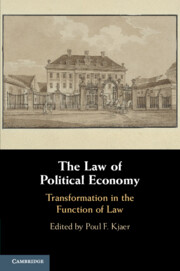Book contents
- The Law of Political Economy
- The Law of Political Economy
- Copyright page
- Dedication
- Contents
- Contributors
- Acknowledgements
- Abbreviations
- 1 The Law of Political Economy
- Part I Studying the Law of Political Economy
- Part II Transformations of the Law of the Globalising Economy
- Part III The Transformation of the Law of Political Economy in Europe
- Part IV Towards a New Law of Political Economy
- 12 The Future of Law – ‘Serial Law’?
- 13 After Governance?
- 14 The Transnational Dimension of Constitutional Rights
- 15 Counter-Rights
- Index
13 - After Governance?
The Idea of a Private Administrative Law
from Part IV - Towards a New Law of Political Economy
Published online by Cambridge University Press: 18 April 2020
- The Law of Political Economy
- The Law of Political Economy
- Copyright page
- Dedication
- Contents
- Contributors
- Acknowledgements
- Abbreviations
- 1 The Law of Political Economy
- Part I Studying the Law of Political Economy
- Part II Transformations of the Law of the Globalising Economy
- Part III The Transformation of the Law of Political Economy in Europe
- Part IV Towards a New Law of Political Economy
- 12 The Future of Law – ‘Serial Law’?
- 13 After Governance?
- 14 The Transnational Dimension of Constitutional Rights
- 15 Counter-Rights
- Index
Summary
A panoptic overview of current governing practices evidences an expansive role of private regulation in a significant range of crucial public policy issues. Whether at the domestic, regional or global levels, such a phenomenon has increasingly become perceived as a conundrum, if not an overall crisis, for modern paradigms of legal and political authority. Building upon the array of case studies that the phenomenon has already elicited, this paper advances four interrelated arguments. First, descriptively, it contends that the administrative state has experienced a large-scale transformation due to the proliferation of a varied, multifaceted and fast evolving range of private regulatory practices. Second, methodologically, after mapping the way these private regulatory practices have been conceptualised in post-national legal theories, it conveys the importance of moving beyond the state of the art by adopting a phenomenological approach to contemporary legal orderings. Third, drawing upon comparative analysis of competition law, it distinguishes two broad models that have emerged to address the private regulation phenomenon: (i) the private ordering model, predominant in the US; and (ii) the private police powers model, predominant in the EU, which, I claim, could be productively understood from a doctrinal perspective as an emergent private administrative law. Finally, at a normative level, I conclude positioning such a private administrative law model as a distinctive conceptual framework to reflect upon the place, role and the very significance of law within a landscape of contemporary political economies characterised by an expanding topography of private regulators.
Keywords
- Type
- Chapter
- Information
- The Law of Political EconomyTransformation in the Function of Law, pp. 320 - 347Publisher: Cambridge University PressPrint publication year: 2020



